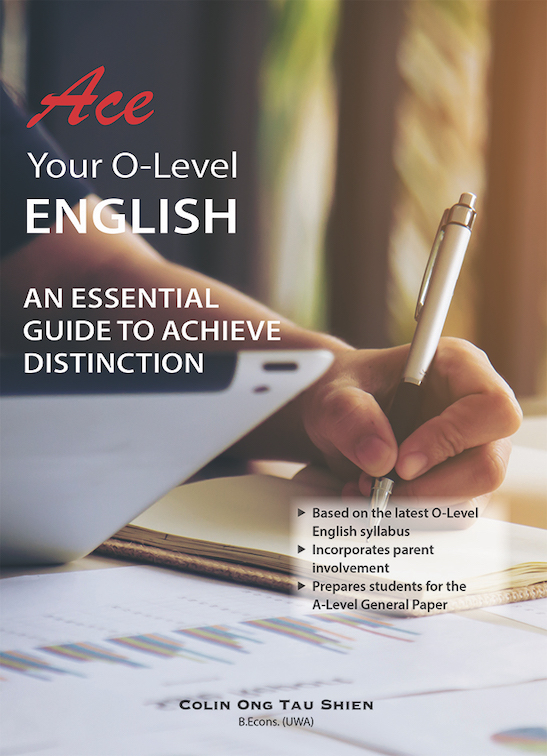Colin Ong Tau Shien is an experienced writer and social commentator. He is an active member of the Economic Society of Singapore, and a contract lecturer at Nanyang Technological University (NTU) specialising in entrepreneurship. Colin is also a recognised curriculum developer with three decades of experience in the educational field, having taught students from various backgrounds and nationalities.
Colin is the author of “Ace Your O-Level English: An Essential Guide to Achieve Distinction”. This book serves to act as a catalyst to help students ace their O-Level English exams with less stress, while also helping them to develop a deeper understanding of the world around them. Encouraging students to be more globally aware helps them to become global citizens, so that they can work collaboratively across diverse cultures and work environments.
The book also presents ample opportunities for parents to add value to their child’s journey into O-Level English. In addition, this book also prepares students for the A-Level General Paper and utilises the flipped classroom learning model.
In today’s post, Colin shares about teaching in today’s fast-paced society, and what students can do to score better in their English papers.
About Your Book

1. How will this book help students to master O-Level English effectively?
The book provides lots of reading references that builds the foundation for English comprehension practice. Additionally, it provides many editing exercises and also allows parents to provide added guidance.
2. Is there a ‘best method’ that students can use to prepare for an English exam?
The student needs to spot a trend of common mistakes that arise from attempting test papers.
3. What are some common mistakes that students make in O-Level English exams?
Poor time planning is a common mistake. Students also make the mistake of not actively reading the comprehension passages. The third common mistake is not paraphrasing their answers well.
4. Why is being globally aware important for students?
By being globally aware, it allows the student to have and understand different perspectives when they look at global issues. It is important to demonstrate this maturity in their critical thinking skills to the examination marker.
5. Can you share why students should get used to the flipped classroom learning concept?
The flipped classroom concept intentionally shifts the mode of instruction to a learner-centred model, in which time in the classroom is used to explore topics in greater depth. It allows for the creation of meaningful learning opportunities while students are initially introduced to new topics outside of the classroom.
6. Can you give examples on how parents can help with their child’s O-level English revision?
Many parents have taken the O-Level English exam before and they can use this book to help their child revise, because it provides added pointers for them to provide guidance.
7. How will this book help students to transition to the A-Level General Paper?
There are quotations and reading materials included in the book that have the same difficulty level as the A-Level General Paper. It is intentionally written in this way to help students to familiarise themselves with the topics seen in the General Paper, as I am also a General Paper tutor.
8. What else can students do to prepare themselves for the A-Level General Paper?
Students must read widely and be open to different viewpoints. They must also build up their vocabulary and appreciate how the Singapore government manages to solve our nation’s pressing issues.
9. Lastly, do you have any other insights to share with parents and students about O-Level English?
The student must build their academic stamina and be mindful of the different criteria needed to maximise the allocated marks so that they can achieve a distinction. It is never a sprint but a mindful step-by-step incremental process of self-discovery.
Parents must not assume that private tuition is the be all and end all to getting distinctions, and should never burden the student with repetitive exercises that do not help in the analytical process that O-Level English requires.
About Yourself/Work/Expertise
1. Can you share with us some interesting facts about teaching Entrepreneurship at NTU?
I have been teaching entrepreneurship for almost 11 years in NTU and I never recycle the same content for my lectures as the business world is dynamic.
2. Why should students study Entrepreneurship?
Entrepreneurship creates new products and helps in the fostering of good corporate teamwork. In essence, the students learn about how other illustrious entrepreneurs faced business challenges and succeeded.
3. Having taught students of various nationalities, can you share some of the interesting ways in how they have approached problem-solving/solutions/difficult questions?
I notice that the dictionary is the centre of developing a good foundation of English words. Many of them supplement their learning by listening to the British Broadcasting Corporation (BBC). They tend to look for debating opportunities too.
4. With three decades of experience in curriculum development, can you share any interesting anecdotes on its evolution over the years?
My observation is that the younger generation have to be rapidly engaged in the learning process, almost in “nanoseconds” like with Tiktok videos.
5. In your opinion, what is an effective curriculum?
Through my experience, it has to be scalable and engaging to catch the attention of students with different abilities.
6. How have teaching methods changed over the last three decades?
Technology is a great enabler for teaching and it allows for more interesting content. For example, considering the outbreak of Covid-19 last year, teaching was able to continue even when the students cannot go to school. More interestingly, the teacher was able to create more engaging educational content that could be delivered online through platforms like Zoom.
7. What advice would you give parents and students on studying effectively for the present day’s curriculum?
Have a sense of curiosity and accept that people may have different viewpoints.
